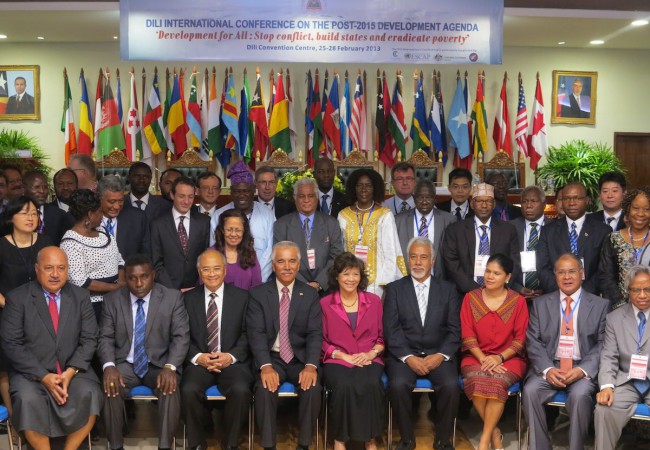
We are not alone
If the thought of international seminars on development makes you want to shove a pencil up your nose and bang your head down on a table – you are not alone.
The major powers will often tell you before hand what is ‘off the agenda’. The donors will have pre-written a ‘zero draft’ of the outcome document days before the meeting. Countries will attend and pretend that they either take the subject matter seriously or are meeting targets that they neither track nor worry about in terms of domestic concerns.
As one wise commentator put it, when it comes to the targets that invariably flow from these meetings ‘we set it to forget it’.
A senior politician once remarked that if an alien ever visited earth and was to attend an international donor conference they would think there were no problems on our planet as country after country made boring speeches on how well they were progressing and everybody agreed on some broad consensus on the way forward.
The reality of development has of late been so far removed from what you hear in these meetings that it is depressing, frustrating and maddening… until now.
Finally, in Timor-Leste there was a meeting where the leaders were not afraid to confront the reality of development: It is hard, messy and downright difficult. But only by facing these concerns honestly and collectively can we hope to improve the lives of our poorest citizens.
Credit has to be given to the Prime Minister of Timor-Leste and to finance minister Her Excellency Emilia Pires, by ensuring that the conference on the post-MDG development goals was truly consultative. From the opening speech, they made it clear that we were all there to share our difficulties and to speak openly. It was indeed refreshing to attend a genuine dialogue, rather than a monologue as is so often the case. The major powers did indeed try to take some issues off the agenda. Many donors were bemused by the fact that there was no ‘zero draft’ outcome, and that the final document would actually reflect what was discussed (what a radical concept – having an outcome document actually reflect the outcomes). But it worked.
Starting with the Pacific Round Table, discussion quickly moved away from generic statements about how well each country was doing in terms of MDG’s and into serious issues, acknowledging the fact that it is almost impossible to measure progress in large Melanesian states, that the challenges of smaller atolls are mainly climate change related, and asking why is there only one indicator for the developed world (aid should be 0.7% of GNI)? Why is there no mention of disability, or climate change, or trade?
As with all genuinely Pacific discussions, good humour was suffused with deep understanding. This is shown in the excellent outcome document. [Read it here in English or French]
The Pacific Round Table set the stage for what was to be a genuinely unique event. The main High Level Dialogue the next day was attended by just under fifty countries – about one quarter of the United Nations. Moving and genuinely informative sentiments were heard from countries from the g7+, PALOP (the group of Portuguese-speaking African countries) and Pacific island countries. The honesty of the dialogue was inspiring to say the least. At last here were countries –many of whom were the poorest as measured by the MDG’s – speaking honestly and openly about the challenges they face. Maintaining a sense of domestic peace and stability whilst trying to build the organs of an efficient state were challenges that everybody seemed to face.
But perhaps the most interesting sentiment came from prime minister Xanana Gusmao, who pointed out that whilst many of the countries present were poor in terms of GDP, between them they held vast resources, whether marine, mineral or land, and that this group of countries together represented significant political and economic wealth. Between the g7+ countries, the PALOP and Pacific they jointly held significant political and economic power – certainly enough to help each other solve their own problems if the will was there.
This was the type of speech that for many older Pacific observers was reminiscent of the old times – shortly after independence, when leaders like Father Walter Lini dared to make bold global statements in order to make the world a better place. A time when Pacific islands were not so focused on their own internal domestic squabbles that they were incapable of working together to get a better outcome for all.
And here was Timor-Leste, the youngest nation in our region, reminding the older nations of the region exactly what the struggle for independence was about – the sense that by acting together on a global scale we can achieve significant results that are also of benefit domestically. We need not always be exploited by outside powers who use our internal and regional divisions to extract our wealth. We can, by thinking and acting together, hope for a better future.
If nothing else, the Dili meeting will stand out for being that one rare moment when hope and honesty were genuinely placed on the table. And maybe, just maybe, some of the Pacific islands will be reminded of what we as a region can achieve if the political leadership and will is there.

